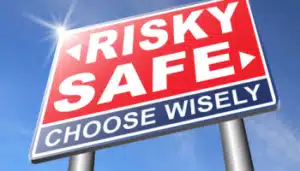 One of the most powerful myths in the Safety industry is the myth of moral choice. This myth will always be sustained as long as Safety continues to resist tackling the need to articulate an ethic of risk. Regardless of all the nonsense language about ‘no blame’, if the power of this myth remains, there will be no change in methods resulting in blame.
One of the most powerful myths in the Safety industry is the myth of moral choice. This myth will always be sustained as long as Safety continues to resist tackling the need to articulate an ethic of risk. Regardless of all the nonsense language about ‘no blame’, if the power of this myth remains, there will be no change in methods resulting in blame.
Any language of choice, good or bad requires some expertise in moral philosophy.
In our online survey on Zero (https://safetyrisk.net/take-the-zero-survey/ ), the belief of ‘safety is a choice you make’ is by far the most troubling result (https://safetyrisk.net/update-on-zero-survey-just-believe/). This belief is one of the principal barriers to the safety industry from ever becoming professional. Without a clearly articulated ethic, Safety will never be a profession.
As long as people think that people chose to be unsafe, the outcome will always be guilt, blame and shame.
If you don’t change the methodology, there will be no change in method.
No wonder Safety loves BBS, bullying (https://safetyrisk.net/how-to-make-observation-and-reporting-a-bullying-process/) and abusing its own people (https://safetyrisk.net/ohs-voices-from-the-resistance-rosa-carrillo/ ). No matter how much spin is generated about ‘psychological safety’, if you don’t shift this myth, methodology and belief, the beltings will continue until the culture improves.
One of the key philosophies that drives the mythology of choice in the safety industry is Behaviourism. This simplistic binary ideology of inputs and outputs has been demonstrated as nonsense for at least 50 years. But still Safety runs back to Heinrich who in 1931 (https://safetyrisk.net/hoodwinked-by-heinrich/) wrote a fictional tale about preventing industrial accidents and called it ‘science’ (https://safetyrisk.net/deconstructing-the-myth-of-heinrich/). And still this ignorant industry places Heinrich at the front of its texts and presentations on Safety as Behaviourism.
Nothing about Heinrich is helpful, intelligent or true.
If you want to read Heinrich’s original text just email me for a copy: rob@humandymensions.com
Of course, linked to all this is, the inability of Safety to seek Transdisciplinary sources in perception, motivation, psychology of goals and social psychological influences on behaviour. When Safety wants to know anything it turns to Dekker, Hollnagel, Heinrich, Reason and the usual mono-disciplinary safety-goop to learn what they don’t know. If you want to understand the psychology of motivation, perhaps start here:
- https://safetyrisk.net/understanding-motivation-is-essential-to-understanding-risk/
- https://safetyrisk.net/motivation-and-de-motivation-in-safety/
- https://safetyrisk.net/non-compliance-and-the-ten-fundamentals-of-motivation/
- https://safetyrisk.net/understanding-goal-states-motivation-and-spor-a-video/
or here: Higgins, Beyond Pleasure and Pain, How Motivation Works.
Safety has no expertise in the psychology of motivation, hence why it is so attracted to the same old culprits of ignorance rather than researching experts in motivation. So, Safety starts with Behaviourism and then tries to fit the world to that worldview. If one actually researched any Transdisciplinary approach to motivation, one would find that Behaviourism was rejected 40 years ago.
Understanding social influences (https://safetyrisk.net/mapping-social-influence-strategies/ ), motivation and perception is essential to understanding that safety is not a ‘choice’ (https://safetyrisk.net/safety-is-not-a-choice/). This delusional myth can only exist if one puts one’s head in the sand and fills it with Safety.
Of course, Safety has no interest in ethics or moral philosophy so why would it want to challenge the myth of moral choice? Just keep to that deontological rubbish from the AIHS (https://safetyrisk.net/the-aihs-bok-and-ethics-check-your-gut/) and ‘check your gut’!
And, keep reading Safety, with no expertise in ethics, to learn about moral philosophy.
A good place to start in learning about moral choice is: Damon and Colby (2015) The Power of Ideals, The Real Story of Moral Choice.
But Safety doesn’t want to read books that might challenges its mythologies and silences.
The beliefs of safety about culture (don’t talk about it) also are determinants of this silly myth of ‘safety is a choice’. The spin of ‘what we do around here’ also keeps Safety ignorant of the power of cultural forces that exist way beyond the power of people in a group. Indeed, a mature understanding of culture demonstrates that many unconscious factors shape the choices people make. This understanding of culture doesn’t come from safety and chemical engineers and understands culture as much more than behaviours and systems.
Choice is a wicked problem (https://safetyrisk.net/update-free-workshop-on-wicked-problems-with-matt-thorne/) and sits in dialectic with determinism. There is no resolution or synthesis in this dialectic. The debate about free-will and determinism has been going on for centuries, its just that Safety doesn’t know about it (https://pressbooks.online.ucf.edu/introductiontophilosophy/chapter/the-problem-of-free-will-and-determinism/ ).
If you do want to learn about moral choice, ethics and culture, you can study here: https://cllr.com.au/elearning/



Do you have any thoughts? Please share them below